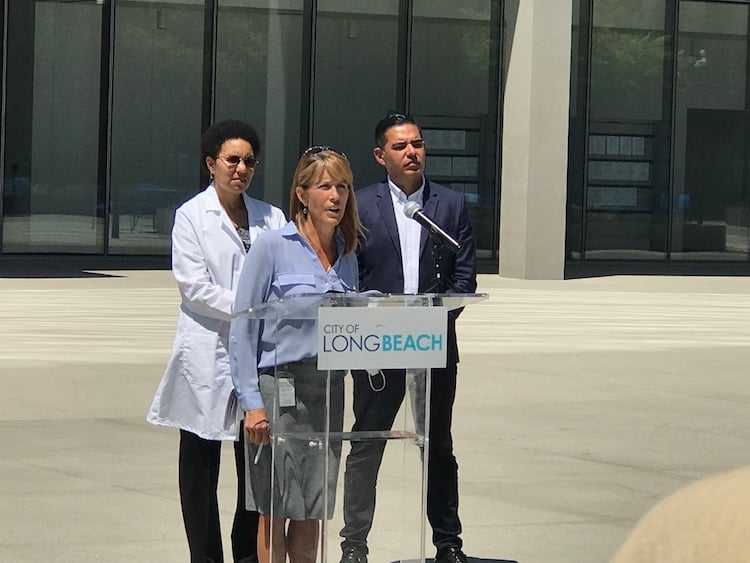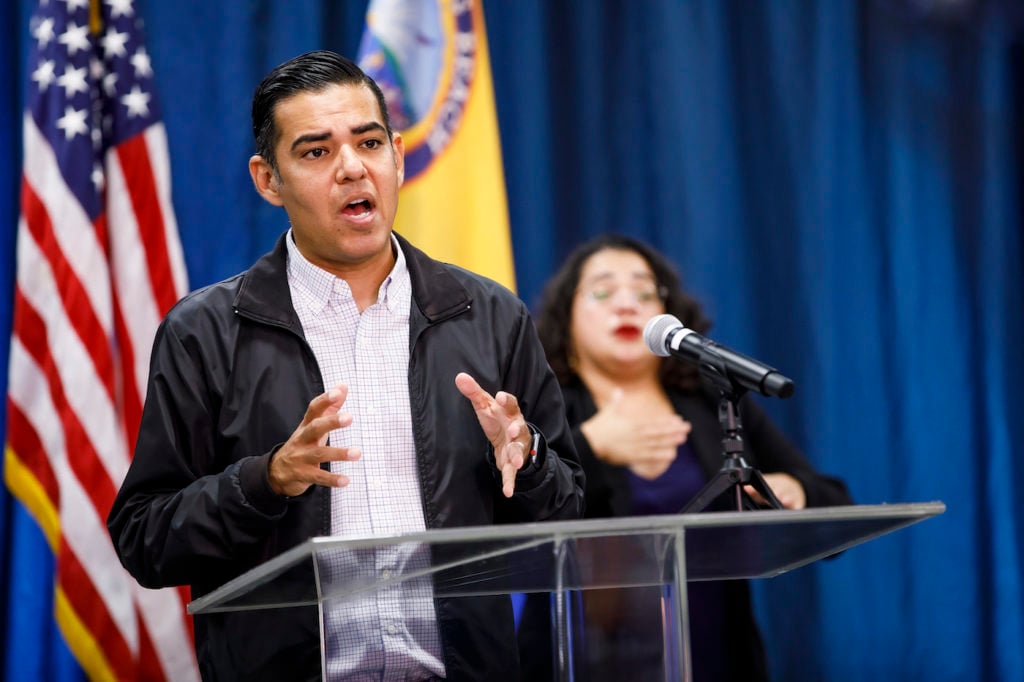
Kelly Colopy, center, director of the Long Beach Department of Health and Human Services, speaks at a press conference on July 27, 2022. She is flanked by Dr. Anissa Davis, left, the city’s medical officer, and Mayor Robert Garcia. During the COVID-19 pandemic, these three city leaders ignored the LGBTQ+ community. Q Voice News asked Davis in 2020 why information on the community was not included in the city’s COVID-19 reports. She said, “It wasn’t a priority.” Photo: Q Voice News
Commentary
Long Beach officials like to promote the city as LGBTQ+ friendly, but city leaders across the board ignored the community during the COVID-19 pandemic.
Happy Pride Month.
Long Beach’s lack of action
During the pandemic, the Long Beach Department of Health and Human Services implemented a COVID-19 digital dashboard that included a variety of basic information on everyone who tested positive at city testing sites: age, gender, zip code, and five categories for race and ethnicity (Asian, Black, Latino, Pacific Islander, and white).
This data provided vital insights on how different groups and demographics were impacted by the virus. For example, health officials knew how many seniors were hospitalized. They knew how many women, and in what age groups, had the virus.
City leadership, including council members, were emailed daily COVID-19 data reports about the dashboard.
LGBTQ+ community missing
But the LGBTQ+ community was missing from the reports, meaning nobody knew how the virus impacted the community in the number of cases, hospitalizations, and deaths.
This information was essential because the LGBTQ+ community was vulnerable to COVID-19:
- The LGBTQ+ community has underlying health conditions (chronic lung disease, cardiovascular disease, diabetes, and HIV)
- The LGBTQ+ community experiences various health disparities, such as discrimination in health care.
Council treats community like invisible
Three city council members (Mary Zendejas, Suzie Price, and Rex Richardson) were asked in separate interviews in 2021 and 2022 about the LGBTQ+ community missing in those reports, and all three officials were oblivious to it.
When they were asked if not recognizing the community was missing was equivalent to treating the community like it was invisible, they said no, but struggled to explain why they didn’t raise the issue with health officials during any council meetings.
Price became visibly frustrated at the question and snapped, “What do you want me to do?”

Robert Garcia, the mayor of Long Beach, speaks at a virtual press conference about COVID-19 July 2, 2020. Garcia acknowledged during another press briefing that the LGBTQ+ community was vulnerable to the virus, but didn’t advocate for the community to be included in the city’s daily COVID-19 reports. Photo: City of Long Beach
Tom Modica, Robert Garcia also ignored problem
Did Tom Modica, the city manager, notice this absence? Nope. He didn’t.
Did Robert Garcia, who identifies as gay and was mayor during the pandemic, point out that the LGBTQ+ community was missing? Nope. He didn’t.
Did any city council member ask Kelly Colopy, director of the health department, or Dr. Anissa Davis, the city’s medical officer, why the LGBTQ+ community was missing? Nope. They didn’t.
At no point during any council meetings in 2020, 2021, or 2022 did anyone in a city leadership position question why the LGBTQ+ community was missing from the health department reports.
These were the council members during that time:
- Mary Zendejas, District One
- Cindy Allen, District Two
- Suzie Price, District Three
- Darryl Supernaw, District Four
- Stacy Mungo, District Five
- Suely Saro, District Six
- Roberto Urango, District Seven
- Al Austin, District Eight
- Rex Richardson, District Nine
Colopy and Davis never even acknowledged that the LGBTQ+ community was missing.
In other words, during an international pandemic, all of these city leaders, who have proclaimed many times at council meetings that they are allies of our community, ignored us. They treated us like we are invisible.
But the incompetence doesn’t stop there. These officials missed the problem on multiple fronts. It was systemic incompetence.
What is SOGI data?
During the early months of the COVID-19 pandemic in 2020, LGBTQ+ advocates across California and the nation were pleading with health departments, clinics, and hospitals to collect sexual orientation and gender identity data, also known by the acronym SOGI.
This essential information would help health departments and other agencies track how the LGBTQ+ community was impacted by COVID-19 in cases, hospitalizations, and deaths.
Also, collecting and analyzing SOGI data helps agencies identify groups within the LGBTQ+ community who are disproportionately underserved and to direct specific funding, outreach, and services to them.
In other words, when health officials have SOGI data, they can not only help people live healthier lives, but also save lives.
The Long Beach Health Department should champion that goal.
Health departments and clinics across the nation, as a standard operating procedure, already ask people for a variety of voluntary information, including age, gender, ethnicity, and race.
Long Beach is unique as one of only three cities in California with its own health department, meaning it could have been at the forefront of collecting SOGI data. It could have been a leader not only in California, but also around the county on this topic.
Instead, health officials turned a blind eye to the LGBTQ+ community, and the SOGI data wasn’t collected.
Here’s what Long Beach missed
In July 2020, California’s SB 932 required healthcare providers and local health departments to immediately collect and report the SOGI data.
Health advocates had been pushing the state and Gov. Gavin Newsom for this collection since the start of COVID-19 in March 2020.
During a May 13, 2020, virtual press conference about California’s refusal to gather the information, one LGBTQ+ advocate said he was “appalled” at the state’s lack of action.
“This is the most troubling wake up call,” Rick Zubur, Equality California’s then executive director, said. “We have to beg public health officials to collect this information. I’m appalled we have to ask for this information. This is a core responsibility of public health.”
Some health advocates have compared the government’s response to the LGBTQ+ community during COVID-19 as similar to how leaders ignored the gay community during the early years of the AIDS crisis when people were dying.
Also, the CDC and two prestigious health groups had recommended collecting SOGI information at least five years before COVID-19 started.
- Here’s what the CDC has said on the importance of SOGI data collection:
Many health care providers do not routinely discuss sexual orientation or gender identity (SO/GI) with patients, and many health care facilities have not developed systems to collect structured SO/GI data from all patients. Without this information, lesbian, gay, bisexual, and transgender (LGBT) patients and their specific health care needs cannot be identified, the health disparities they experience cannot be addressed, and important health care services may not be delivered.
Collecting SO/GI data in electronic health records is essential to providing high-quality, patient-centered care.
- The article also mentions that SOGI data collection was recommended by the National Academy of Medicine in 2011.
- The Joint Commission recommended gathering the data in 2015.
Officials questioned
- Q Voice News pointed out the problem of missing SOGI data at more than three press conferences in the early months of the pandemic in 2020, yet neither Davis nor Garcia, who were present at these media events, acknowledged the problem. Instead, they enabled the problem with a rotating list of excuses on why it was missing. In one press conference, Davis said it “wasn’t a priority.” At another news conference, Davis said the information was being collected, but it really wasn’t.
- By August 2020, after being consistently questioned by Q Voice News, the health department eventually tried to collect SOGI data. However, it was done quietly with no public outreach to the LGBTQ+ community about why the data was being collected and how it would be used. In the end, it was clumsy and failed to collect a significant amount of data that could be used.
Long Beach’s incompetent leadership
How did Long Beach officials explain their incompetence?
The city council ended the COVID-19 emergency declaration on Feb. 21. It was the perfect time for city leadership to take responsibility and for the health department to chart a new path to collect the SOGI data and encourage other agencies in Long Beach to follow suit.
Instead, Colopy, Davis, and Modica, and the entire council acted like nothing had happened, and kept their heads in the sand. And, once again, they treated the LGBTQ+ community like we are invisible.
Colopy and Davis gave a 54-page slide presentation, “COVID-19: Ending the Emergency,” but provided no explanation about the missing SOGI data.
The council, Modica, and Mayor Rex Richardson were oblivious that the essential SOGI data was absent.
After the November 2022 election, three new members joined the council. Unfortunately, they are just as out-of-touch with the LGBTQ+ community as the rest of the council nincompoops.
The new members are Kristine Duggan of the Third District, Megan Kerr of the Fifth District, and Joni Ricks-Oddie of the Ninth District. Ricks-Oddie might be the biggest disappointment. She is an epidemiologist at UC Irvine, and on her campaign website, she talked about the importance of supporting marginalized communities.
“In everything she does, Joni brings a lens of equity and respect, working with underserved and disenfranchised communities conducting research, and delivering concrete plans to improve health outcomes,” according to her campaign website.
But her actions on the council have shown she has failed the LGBTQ+ community.
Kick-in-the-face to LGBTQ+ people
However, city leadership did congratulate themselves at that Feb. 21 meeting.
Colopy claimed the city “was at the forefront” during the pandemic. In reality, the city would have been at the forefront if Colopy had exercised leadership skills and had the department collect the SOGI data.
Davis said the health department’s COVID-19 data dashboard organized data by zip code, gender, and race/ethnicity to convey disparities on COVID-19 impacts. Davis didn’t mention that the LGBTQ+ community was missing. Oops. Someone was asleep at the switch.
Zendejas: “One of the greatest things we have in the city of Long Beach is having our own health department. What’s even more important, and I’m even more grateful for is having exemplary people leading in this.” Obviously, Zendejas doesn’t understand what exemplary means.
Saro: “We’ve shown in the city of Long Beach and nationwide that this is an example of what happens when you have the right leadership. Local government can do it right.” Actually, this is an example of what happens when you have nitwits in leadership positions.
Ricks-Oddie: “You’re never going to hear me do anything up here but sing the praises of our health department and the wonderful work that you do. So much of the work we did over the past three years, building trust with communities that didn’t trust the city… having to be creative about engagement, we have to take that with us.” Unfortunately, the epidemiologist out the council is out-of-touch with the reality of what happened during the past three years with the LGBTQ+ community.
Allen: “You all are superheroes.” Wrong. Superheroes would not have ignored the LGBTQ+ community during the pandemic.
Richardson: “Robert Garcia demonstrated leadership…Mayor Robert Garcia did a great job.” Garcia actually did a horrible job and demonstrated poor leadership. He did a great job of ignoring the problem.
The incompetence of Long Beach leadership is staggering.
Colopy and Davis’ failure to have the health department collect SOGI data during COVID-19, and the city’s cruelty in treating the LGBTQ+ community like it’s invisible was a catastrophe.
We lost critical information that would have helped the health and well being of the LGBTQ+ community in Long Beach. We will never know how the LGBTQ+ community was impacted.
Where is the accountability for this disaster?
